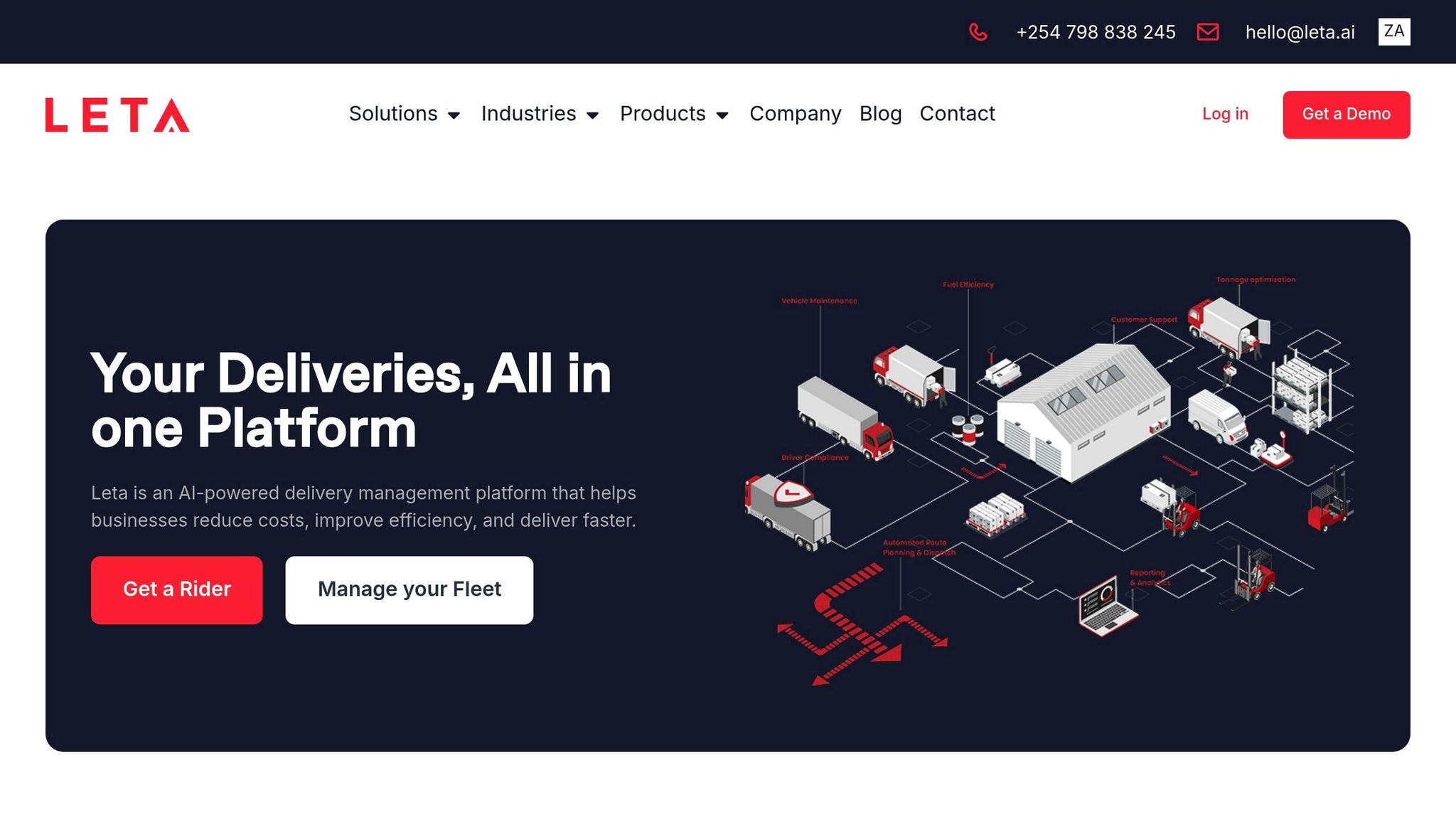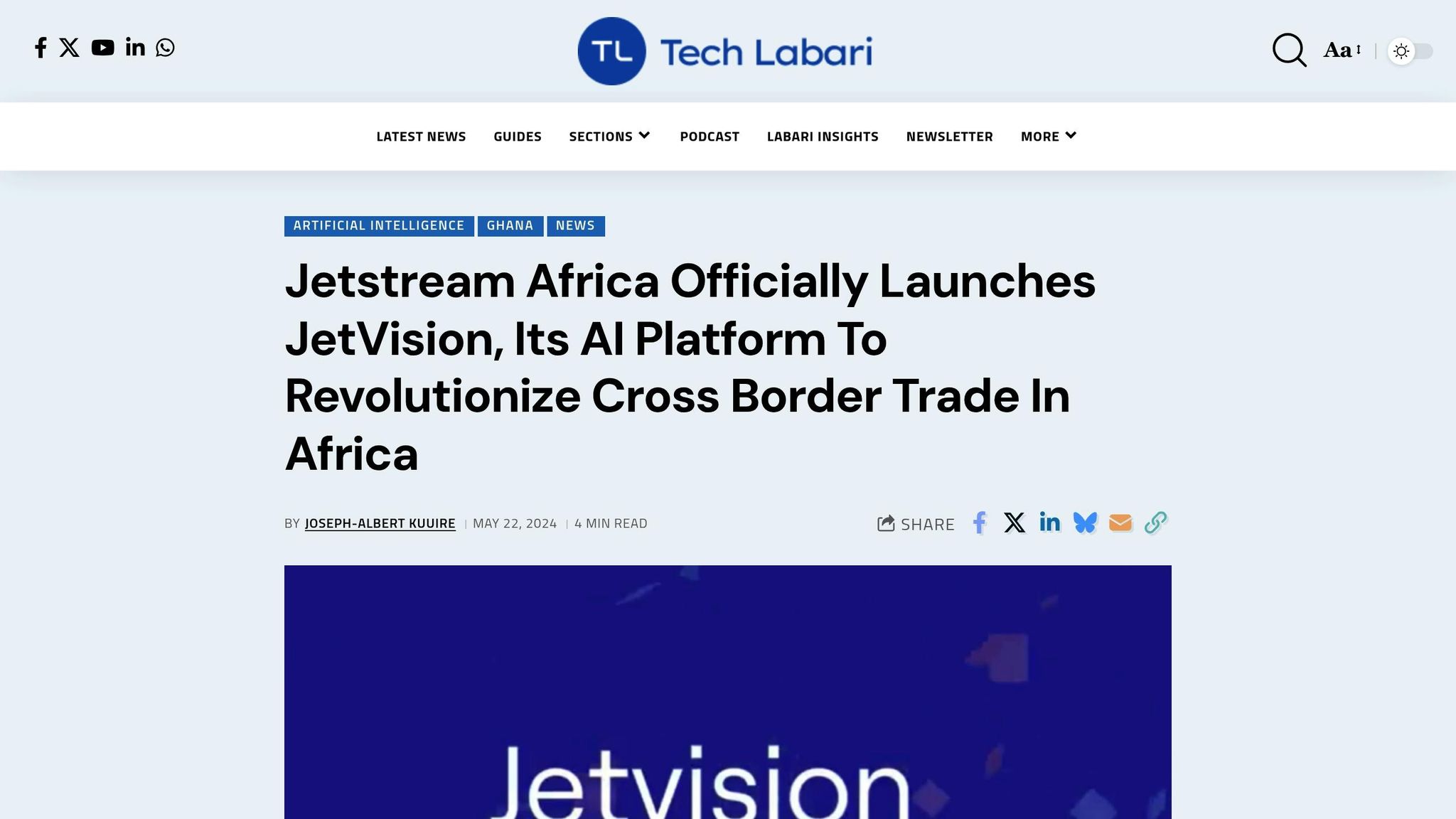AI is reshaping logistics for African startups by solving challenges like high costs, poor infrastructure, and cross-border trade complexities. Tools such as machine learning and predictive analytics help automate tasks like route planning, shipment tracking, and freight management. Companies like Leta and Logidoo are already seeing results, with faster deliveries and reduced operational costs. Despite hurdles like data quality issues and talent shortages, startups adopting AI are scaling operations and improving efficiency.
Key Highlights:
- Logistics Challenges: Poor infrastructure, high costs (up to 75% of product price), and regulatory hurdles.
- AI Solutions: Route optimization, real-time tracking, predictive analytics, and automated freight handling.
- Results: Up to 20% faster deliveries, 15% cost reduction, and improved shipment visibility.
- Examples: Leta expanded deliveries from 500,000 to 4.5 million; Logidoo aims to expand into 10 countries.
AI is becoming essential for startups aiming to streamline operations and compete in the evolving logistics landscape.
Africa’s AI Boom: Meet the Startups Shaping the Future!
Key AI Applications for Logistics
African startups are tackling challenges like fragmented infrastructure and high operational costs by implementing three key AI applications. These innovations are helping streamline logistics operations, delivering measurable improvements in efficiency and cost management.
Route Planning and Optimization
AI is revolutionizing how African startups plan delivery routes. By analyzing data such as traffic patterns, weather conditions, vehicle capacity, and delivery history, AI algorithms identify the most efficient paths for drivers and shipments.
Take Leta.ai, a Kenyan firm that expanded its AI-driven logistics platform across West Africa in 2025. Their system uses smart algorithms that adapt to real-world conditions, optimizing delivery routes to cut fuel consumption and shorten delivery times. The platform integrates seamlessly with existing business systems, automatically generating routes that save time and resources.
Another standout is Logidoo, which combines route optimization with predictive maintenance. Their AI-driven approach aims to reduce delivery times by 20%, cut operational costs by 15%, and achieve 95% on-time delivery rates. Beyond planning routes, their system predicts vehicle maintenance needs, helping avoid breakdowns that could disrupt operations.
AI also adjusts routes in real time to handle unexpected factors like traffic jams or sudden weather changes, ensuring deliveries stay on track. This adaptability keeps operations running smoothly, even in the face of disruptions. Alongside optimized routing, AI-powered real-time tracking ensures shipments remain visible every step of the way.
Real-Time Tracking and Predictive Analytics
AI is transforming shipment tracking, addressing a long-standing issue in African logistics: lack of visibility. Modern AI-powered systems go beyond basic location updates, offering continuous monitoring that integrates data from multiple sources.
These platforms track vehicle locations, cargo conditions, estimated arrival times, and potential delays all at once. Machine learning algorithms process this data to predict and mitigate problems before they escalate. For example, Leta’s platform provides live shipment monitoring by connecting directly with business systems. It doesn’t just display package locations – it also analyzes patterns to improve vehicle utilization and offers actionable insights for logistics managers. Businesses can identify high-performing routes, pinpoint operational bottlenecks, and make smarter decisions about resource allocation.
Predictive analytics further enhance efficiency by forecasting potential issues. By analyzing historical and real-time data, AI can predict delays, equipment failures, or regulatory challenges. This foresight allows teams to reroute shipments or alert customers about possible delays, keeping operations proactive rather than reactive.
As tracking and analytics improve oversight, AI is also automating the intricate processes involved in freight management.
Automated Freight Management
Cross-border trade in Africa comes with a maze of documentation, compliance requirements, and coordination across multiple entities. AI is simplifying these traditionally manual processes, reducing errors and speeding up shipment handling.
Swiftway Shippers in Ghana demonstrates the impact of automation. Between May and September 2025, the company processed over $44,000 in shipment value and earned $5,000 in revenue by integrating cargo pickup, customs clearance, and real-time tracking into a single automated platform. Their system manages the entire freight forwarding process, from booking to final delivery, cutting down on the manual coordination typically required for cross-border logistics.
Jetstream’s AI platform takes a proactive approach to cross-border trade. It analyzes regulatory requirements, flags compliance risks, and automates documentation. This helps avoid costly delays at border crossings, ensuring smoother shipment transitions between countries.
In Rwanda, AFRIKABAL is combining blockchain with AI to enhance transparency and security in agricultural supply chains. Their platform automates transactions among farmers, buyers, and logistics firms, streamlining agricultural shipments while maintaining strict quality standards. This reduces the time and complexity involved in coordinating shipments that often involve multiple stakeholders.
AI-powered automation also simplifies documentation. Systems can generate shipping documents, verify compliance with local regulations, and flag potential issues before shipments reach borders. This not only reduces the workload for logistics teams but also minimizes delays caused by incomplete or inaccurate paperwork.
Case Studies: African Startups Using AI for Logistics
These examples showcase how African startups are using AI to tackle logistical challenges and improve operations.
Logidoo: Smarter Route Planning with AI

Logidoo is making waves in Africa by using AI to optimize delivery routes. Their algorithms analyze both real-time and historical data to chart out the most efficient paths, even accounting for fragmented infrastructure. On top of that, they use predictive maintenance to minimize vehicle breakdowns, keeping operations smooth. Backed by $1.55 million in seed funding and a $50,000 grant from the International Development Research Centre, Logidoo has ambitious plans. They’re aiming to expand their customer base by 50% in the next two years and extend their services to 10 additional African countries. These efforts are set to make logistics more accessible for businesses, big and small.
Leta: Using Real-Time Data to Streamline Operations

Leta.ai has taken a software-first approach to logistics, partnering with fleet owners and offering AI-driven tools to enhance efficiency. By integrating its platform with existing systems, Leta pulls live order data and replaces manual dispatching with automated processes, cutting operational costs. This strategy has paid off – revenues have grown fivefold, and the company is now targeting even greater growth as it enters new markets. Big names like KFC and Diageo have adopted Leta’s solutions, and the startup secured $5 million in seed funding from Speedinvest and Google’s Africa Investment Fund. In 2025, Leta expanded its platform across West Africa by collaborating with local supply chain companies, proving how scalable its model can be.
Jetstream: Tackling Cross-Border Trade Challenges

Jetstream is simplifying cross-border logistics by automating the often complex documentation process and identifying regulatory risks. Their AI-powered platform reduces paperwork, flags potential delays, and ensures compliance, making freight management faster and more reliable. By addressing Africa-specific challenges with local AI expertise, Jetstream has become a trusted solution for startups navigating multiple markets. Their innovations are helping businesses operate more efficiently in a highly dynamic sector.
sbb-itb-dd089af
How to Implement AI in Your Logistics Operations
After understanding the potential of AI, the next step is putting these solutions into action within your logistics operations. African startups, in particular, can adopt a focused approach that reduces risks while reaping the rewards of these advanced tools.
Partner with Technology Providers
Collaborating with established platforms offering capabilities like route optimization and predictive analytics is a great starting point. Companies such as Leta and Logidoo have already invested heavily in AI infrastructure, giving businesses access to reliable algorithms and integrations with enterprise systems.
When choosing a platform, consider its ability to integrate with your current systems, the range of AI features it provides, its coverage across African markets, and its pricing structure. Many platforms use API-based integrations, allowing data to flow smoothly between your systems and the AI tools. This reduces manual data entry and boosts operational efficiency.
Prepare Your Logistics Data for AI
The quality of your data directly impacts AI’s effectiveness. Start by auditing and cleaning your existing data sources, such as delivery records, vehicle details, customer information, order histories, and route data.
The preparation process involves three key steps: collection, cleaning, and integration. Focus on gathering real-time order data, including SKUs, product details, prices, and customer locations, as these are crucial for route optimization. Fix errors, ensure data is up-to-date, and unify your sources into a single system. Strong data governance practices are essential to generate accurate predictions from AI.
This phase typically takes 2-4 weeks but is critical for achieving the performance improvements AI can deliver. Once your data is ready, your team can move on to adopting and fine-tuning AI tools.
Start Small and Train Your Team
Instead of rolling out AI across all operations at once, begin with a small-scale pilot. This allows your team to gain confidence, address any integration challenges, and fine-tune processes before expanding.
Startups like Leta have shown that gradual adoption leads to measurable success before scaling up. Conduct phased training sessions for key team members in areas like dispatch, operations, customer service, and management. Teach them how to navigate the system, interpret AI recommendations, and troubleshoot issues. Designate an internal AI champion who can lead ongoing training efforts and monitor adoption progress.
Keep in mind, AI is there to assist, not replace, human decision-making. Dispatchers can still review and adjust AI-generated route suggestions based on local insights or unique situations.
Most platforms include built-in analytics that track metrics like delivery times, operational costs per delivery, on-time delivery rates, and vehicle utilization. Setting up a dashboard to display these metrics helps teams visualize the system’s impact and pinpoint areas for further improvement.
Benefits and Challenges of AI-Driven Logistics
AI has shown its potential to transform logistics by streamlining operations, reducing costs, and improving efficiency. A great example is Leta.ai, which achieved a 30% reduction in delivery times across West Africa by leveraging predictive analytics to anticipate delays and automate dispatch decisions. This not only improved customer satisfaction but also cut operational costs significantly.
Cost savings are another major advantage, though they often take time to materialize. For instance, Swiftway Shippers in Ghana utilized integrated AI systems to lower their operational expenses. However, while these benefits are appealing, implementing AI-driven logistics is not without its challenges.
Data Issues and Infrastructure Costs
One of the biggest obstacles is poor-quality data. Many startups in Africa lack comprehensive logistics records, such as accurate delivery times, route details, and inventory levels. Without clean and structured data, even the most advanced AI systems struggle to deliver reliable results.
On top of that, the upfront costs of adopting AI can be daunting. Beyond purchasing AI tools and infrastructure, businesses must also account for integration, staff training, and ongoing maintenance. For early-stage startups with limited resources, these financial demands can be overwhelming.
Talent Shortages and Connectivity Problems
Another significant hurdle is the shortage of skilled professionals in AI and data science across Africa. This talent gap makes it difficult for companies to build internal expertise or manage AI systems effectively. Compounding this issue is inconsistent internet connectivity and unreliable power in certain regions, which can disrupt operations and limit the potential of AI-driven tools.
Benefits vs. Challenges: A Side-by-Side Look
| Benefits | Description | Challenges | Description |
|---|---|---|---|
| Efficiency | Automated route planning reduces delivery times by up to 30% | Data Quality | Incomplete or fragmented logistics data undermines AI’s accuracy and decision-making capabilities |
| Cost Savings | Operational costs drop through automation and optimization | Upfront Costs | High initial expenses for AI tools, integration, training, and system maintenance |
| Transparency | Real-time tracking and clear documentation build customer trust | Skills Gap | Limited AI and data science talent hampers adoption and scaling |
These contrasting factors illustrate the complex nature of AI adoption in logistics. Even promising startups like Nigeria’s Kobo360 and Kenya’s Lori Systems faced challenges scaling their operations due to funding pressures and an inability to deliver on tech-driven growth.
Despite these hurdles, the sector remains promising. Between January 2019 and March 2025, African AI startups raised $1.25 billion, including $40 million in 2025 alone. This level of investment shows that startups willing to tackle these challenges head-on can position themselves for long-term success.
Conclusion: The Future of AI in African Logistics
The logistics landscape in Africa is evolving at an impressive pace, with AI playing a central role in addressing long-standing supply chain challenges. Startups across the continent are leading this shift, finding innovative ways to modernize logistics systems that have struggled with inefficiencies for decades.
This progress is being bolstered by substantial financial investment. The African AI market is expected to hit $16.5 billion by 2025. Such funding is empowering companies like Logidoo to expand into 10 additional African countries and enabling Leta to grow its footprint across West Africa. These advancements highlight the growing confidence in AI’s ability to reshape the region’s logistics sector.
One of the standout impacts of AI is its ability to bring informal networks into streamlined, efficient supply chains. By improving transparency and optimizing operations, startups are addressing issues at the last-mile level, an area that has historically been plagued by fragmented transportation systems. Even small efficiency improvements can translate into significant competitive advantages for businesses.
However, challenges remain. Issues like poor data quality, high infrastructure costs, and talent shortages must be addressed to fully harness AI’s potential. Yet, success stories from countries like Ghana, Kenya, and Nigeria show that startups tackling these problems are emerging as leaders in the field, building scalable and sustainable business models. Experts agree that adopting AI is no longer optional but essential for African startups aiming to scale and compete on a global stage.
While obstacles persist, the momentum of digital transformation is undeniable. AI-driven platforms are set to become the backbone of supply chain operations, driving efficiency and opening up new opportunities. Entrepreneurs who act now – by collaborating with tech providers, refining their data, and launching targeted pilot programs – will be well-positioned to tap into new markets and drive economic growth across the continent.
For African entrepreneurs, the real question isn’t whether AI will reshape logistics but how quickly they can adapt to lead this transformation. The future is digital, and the time to act is now.
FAQs
What strategies can African startups use to address data quality issues and talent shortages when adopting AI for logistics?
African startups can address data quality issues by prioritizing data cleaning tools and adopting practices to gather precise and dependable information right from the beginning. Collaborating with local experts or organizations to create standardized and validated datasets can further enhance the data’s effectiveness for AI-driven solutions.
When it comes to talent shortages, startups can focus on training their current workforce through AI-focused courses or certifications. Building partnerships with universities or tech hubs can also provide access to a pool of fresh talent. For startups that lack in-house expertise, using AI-as-a-Service platforms offers a practical way to streamline logistics and implement AI without needing a dedicated team.
What AI technologies are helping African logistics companies overcome challenges in cross-border trade?
AI is shaking up cross-border trade for African logistics companies, tackling challenges like route planning, customs procedures, and predicting demand. Machine learning dives into massive data sets to identify the quickest and most budget-friendly shipping routes. Meanwhile, natural language processing (NLP) simplifies communication with customs and regulatory agencies by automating documentation, making the process far less tedious.
On top of that, AI-driven demand forecasting tools help businesses manage inventory more effectively and cut down on delays, keeping supply chains running smoothly. These advancements are giving African startups a real chance to shine on the global stage by making logistics operations more efficient and dependable.
How do AI-powered logistics tools like Leta and Logidoo streamline operations for African startups?
AI-driven logistics platforms, like those from Leta and Logidoo, are transforming how African startups manage their operations. These tools integrate effortlessly with existing business systems, using advanced algorithms to streamline route planning, inventory management, and demand forecasting. The result? Lower operational costs and faster delivery times.
By automating critical tasks, these solutions free up businesses to concentrate on scaling their ventures while maintaining efficient supply chain management. Their flexibility in addressing local challenges makes them a game-changer for startups navigating Africa’s dynamic markets.






